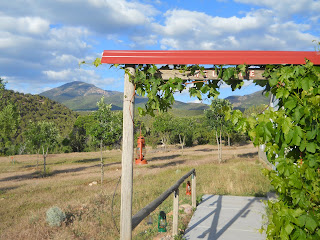1.
I arrived at Dry Creek Friday night followed by a strong, sharp wind from the south. That is something relatively new to the west. As a child, winds were predictable. When they came from the north, they were always biting, no matter the season (freezing in the winter, crisp in the summer); when they came from the south, they were always balmy, no matter the season (warm in the winter, scorching in the summer). When they came from the west, they were the temperature of the season. Winds were predictable then. About 2000 that began to change. We now occasionally have fronts come with cold winds from the south. I’m not sure what causes that, although my guess would be an erratic jet stream. I’ll have to research it. The bigger question is why doesn’t such a major shift in weather make the news? Except on the Weather Channel, climate change doesn’t exist even though we witness it all around us.
However, Memorial Day weekend is predictably cold here--winter’s last merrymaking before summer knocks on the door, enters, and kills the murderous party with sunshine and awkward pleasantries.
Therefore, I planted the vegetable garden Saturday wearing a heavy, hooded coat over a sweatshirt. On an earlier trip, I’d made three large planting beds out of railroad ties, raised not for the convenience of harvesting, but rather because the soil where I wanted the garden was mostly a gravel and sand fill brought in when our house was built.
 |
| One of the beds before planting |
So, for the garden, we laid chicken wire on the ground (to keep the groundhogs from harvesting from below) and then filled the large railroad tie boxes with rich soil dug from the bottom of the irrigation pond. The rectangular beds gave me three regular geometric shapes for the theme of my garden composition. To add the variation, I used sandstone river rock to create a circular path inside the boxes--a quarter of a circle for each box. Then, because the final box is missing, I carried the circle out into the void with a three-quarters circular flower bed. A round table will sit on part of the flagstone patio here. The trick is to lock shapes into larger patterns like images in a poem--where they both stand separate and bleed together simultaneously. It is totally collage. Gardening and poetry require the same thought patterns--how do I group?; how do I separate?--how do I do both simultaneously?
 |
| One of the beds after beginning to frame in the trail |
 |
| The vegetable garden with completed trail. Next will come a rail fence. |
 |
| The completed garden from the back. A rail fence will frame it in and discourage deer. |
2.
Sunday morning was cold. I went to sacrament meeting and meant to stay for Sunday school and priesthood, but during the closing prayer, I started to cry inexplicably over Joe, my step-dad, who passed away last winter. So, I got up and went over to the cemetery, which is near by. My mom has been so devastated she hasn’t ordered his headstone even though we buried his body back in January. As there was nothing said in church to trigger the tears and I haven’t cried since the funeral, I think Dad was telling me to get this taken care of.
So, there you have it--my impeccable ability to alienate my audience. I’ve alienated my conservative base with by mentioning climate change and I’ve alienated any atheists or agnostics by mentioning that I believe my stepfather (along with my father) talk to me from the other side of the veil. The only possible audience I have left is the new-agers, but I’m sure I’ll get around to offending them sooner or later.
It’s hard to have a significant audience when your thoughts don’t fall into neat categories. Though I practice Mormonism because it is what I believe, I am a Buddhist by nature, for I always find myself in the middle. For example, I can’t fully identify with either conservatives nor liberals, zealots nor atheists, artists nor laborers, and so although I would love to experience the camaraderie of agreement, which I’m sure must be the most pleasant experience in the world, I always find myself on the outside looking in--too connected with the group to walk away, say forget you, but not connected enough to fully join in. Buddhists say that enlightenment is the middle way. I find it to be more of a curse, but they’d probably agree with that, at least in theory, if not in practice.
3.
Last night I went to bed tired but dreading it because I’m here without Marci. I couldn’t sleep, so I wrote two versions of a poem--the first, very quickly, a journal entry really. The second version I pried loose from my personal life--hoping to intensify images by freeing it from actuality. Right now, I’m not sure which I like best, perhaps the first, because it sounds less forced.
Alone (Version 1)
On the wall is a poem
about the cold, the road
and missing you.
Outside deer lurk
in the darkness
waiting for the light
to go out so they can attack
our vegetables.
In the cemetery they lurk also,
eyes set on the flowers
on Dad’s grave.
It’s been cold and gray.
I’ve been missing you.
Alone (Version 2)
Moonlight on lacquered lead paint.
The wall is a poem about the cold, the road,
the stale smell of the butane heater. “Missing You”
dribbles out from the end
of the broken shower.
Minus signs bounce
off icy green
tile.
I want to hear you talk about feeding chickens
cucumber sandwiches under the warm willow.

No comments:
Post a Comment